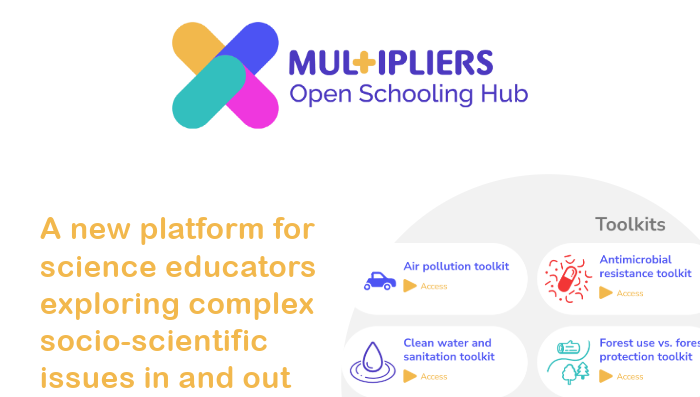
CC-BY, provided by author
Are you a science educator looking for free, cutting-edge materials to explore complex socio-scientific issues in and out of the classroom? Then look no further! The MULTIPLIERS Open Schooling Hub is a new platform hosting a wealth of teaching and learning resources for educators aiming to bring science teaching into the real world.
Eight toolkits are available on the platform, delving into the topics of air pollution, antimicrobial resistance, biodiversity and ecosystems, sustainable agriculture, clean water and sanitation, and forest use vs. forest protection and vaccination. Tools gathered in each toolkit follow a proven and tested approach to increase students’ interest in science and improve their science career awareness, all while building stronger links between students, schools, experts, families and wider communities.
The activities help students to deeply consider real-world challenges and become knowledge multipliers, engaging their communities in tackling issues discussed in school. Educators can search for individual activities and activity sequences, selecting the desired age range, duration, main topic and focus competencies (e.g. scientific inquiry, argumentation, problem or project-based learning, cooperative work, etc). Activity formats vary from traditional to innovative approaches, such as jigsaw games, debates, experiments, reflection, learning in the lab, and meetings with experts, among others.
The MULTIPLIERS Open Schooling Hub showcases the outputs of the EU-funded Horizon 2020 project MULTIPLIERS. Throughout the past three years, the project has worked on creating so-called Open Science Communities, following an Open Schooling approach to establish collaborative networks among schools, universities, informal education providers, museums, local associations, industry and civil society. This has expanded the opportunities for students to learn about science in real-world settings, thus making it more relevant to their everyday lives.
‘I think it’s very important to have authentic themes to work on and to make learning about science relevant to everyday life,’ said Professor Annette Scheersoi, a specialist in sustainability science education from the University of Bonn and coordinator of MULTIPLIERS. ‘When you are interested, you remember better, but you also connect more and feel the value and relevance,’ she said.
All materials in the Open Schooling Hub were prepared in close collaboration with researchers and teachers from various fields – including science, ethics, pedagogy, science communication and education for sustainable development – who contributed to developing and enhancing each tool.
You can access the platform here to download our toolkits and activities. To learn more about the project, visit our website.
About the author
Priscila Jordão is a Communication Officer at the European Forest Institute. She has an academic background in journalism, international media, biodiversity and nature conservation, having become involved in science education through her participation in the MULTIPLIERS project, funded by the European Union’s Horizon 2020 Research and Innovation Programme.
Tags: career awareness, inquiry-based learning, project-based learning, real-world settings, science careers, Science Teaching, STEM education, STEM education platform, sustainability, toolkit


Recent Comments